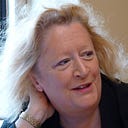Member-only story
Who the heck is Margaret Heffernan?
In England, people think I’m American and in America, people see me as British. I’ve been asked if I’m a corporate shill and challenged as to whether I’m a communist. I love technology and am deeply hostile to it. I’m a Professor but I’m not an academic. I’ve worked in radio, television, film and technology, run 5 companies, written 6 books, 6 plays and made music videos and one deeply forgettable film about how the rabbit came to be introduced into Britain. So sometimes people get a little confused.
But to me it’s all very simple. I am an insider and an outsider. I know what it’s like running companies — I’m also chronically annoyed that companies don’t serve markets, society and their employees better. These two perspectives mean that I can talk to business leaders as peers, without flattery and with an acute ear for nonsense and spin. I don’t think there’s any point writing except to change the world for the better, for everyone.
That sounds cheesy and sentimental but actually it’s just hard. I don’t write what I think of as recipe books: follow these three — or five or six or seven — simple steps and eternal success will be yours. If it were that easy, the world wouldn’t be on fire, CEOs wouldn’t be in court and four million Americans wouldn’t have quit their jobs in April — followed by four million more in May. We make stupid mistakes all the time…
